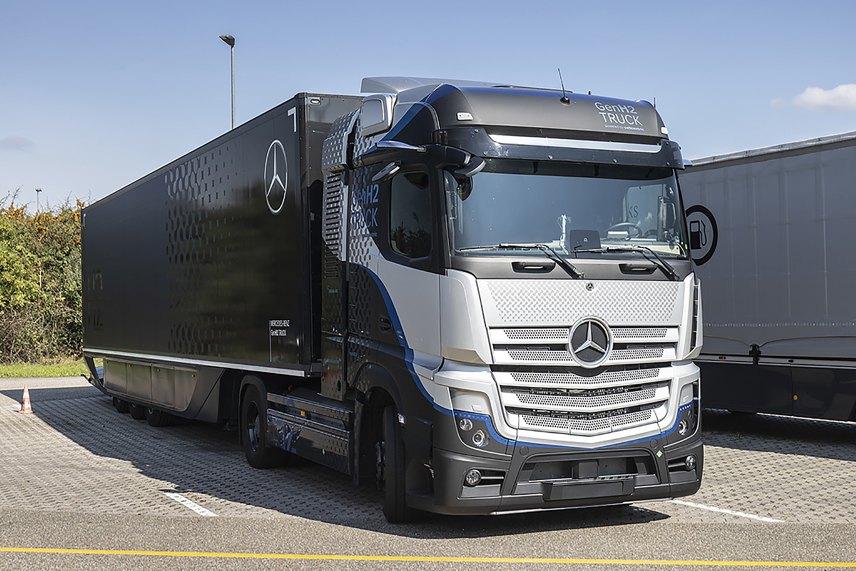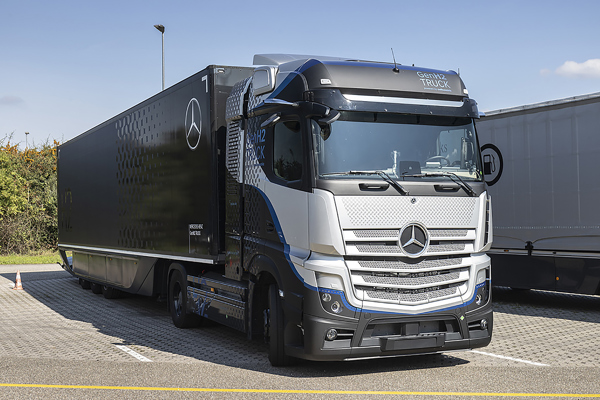Review
Its no secret that many of the global truck manufacturers are developing both battery electric and hydrogen fuel cell for short and long range operations. In last months road test we looked at the latest generation eActros powered by two battery capacities, 315kWh and 420kWh using either three or four 105kWh modules. Whilst these are capable of distances around 350-500 kms, according to the Mercedes-Benz Truck team they are not the answer for much longer Pan-European distances.
To this end, Mercedes-Benz Trucks are developing a completely new generation of trucks with a drive system based on fuel cells and hydrogen and this is the basis of their GenH2 Truck. The performance characteristic of a hydrogen fuel cell truck is comparable to that of a conventional diesel truck thanks to the use of liquid hydrogen, which has a far greater energy density than hydrogen in gaseous form. This potentially allows operators to use alternative fuelled trucks on demanding trips of up to 1000 kilometres and more, without the need to stop and refill.
Indeed according to research carried out by the company, contrary to popular belief, they forecast that annual mileages for truck above 20 tonnes will increase by approximately 25-30% and remember, long haul trucks contribute 48% of CO2 emissions in the EU.
The GenH2 is the first prototype and has been under the research and development team at Mercedes-Benz Trucks from April 2021, the first trials on the open road are due to start before the end of the year. Customer trials are scheduled for 2023 and from 2027 the first series-produced GenH2 Trucks will be handed over to customers.
The development of the GenH2 requires significant changes to the driveline and specifically the cooling system of the existing diesel powered ‘standard’ Actros and involves the replacement of the conventional systems as well as integration of the new components.
Starting with the electric motors (eMotors), indeed there are two powerful motors on-board rated at 230kW of continuous power and up to 330kW at their peak power. The torque developed is rated at 1577Nm of continuous torque and upto 2071nm of torque at its maximum., these are powered by a 800V voltage system, unlike many vans and cars which use 315-415V systems.
The motors are powered by two underlying systems, one the fuel cell and the other the battery. The 300kW fuel cell system is made up of two 150kW cells and the high voltage batteries is rated at 70kW with a peak of 400kW.
When Mercedes-Benz were looking for the type of hydrogen they would use there were four potential ‘candidates’ :
- Liquid Hydrogen ( LH2)
- Compressed Hydrogen Gas ( CHG) at 35MPa
- Cyro-Compressed Hydrogen ( CcH2)
- Compressed Hydrogen Gas at 70Mpa
In the end the research and development team chose the Liquid Hydrogen solution, which has specific advantages which include :
- High Storage Capacity upto 80kg of H2 without the need for additional packaging space. For instance the Compressed Hydrogen Gas alternative would only supply 55kg of hydrogen at 70MPa, around 30% less usable fuel.
- Energy Efficient as fuelling significantly lower power required than CHG.
- Cost Efficient as no carbon fibre tanks are required.
- The system is a lot lighter compared to all the other alternatives
- Scalable as the infrastructure is relatively low cost.
One of the major challenges facing the research and development teams is the balance between the size of the fuel cell versus the size of the Lithium-ion battery.
A smaller fuel cell results in significantly higher consumption and the fuel cell lifetime will decrease due to the higher load. This is the same for a smaller battery as a smaller one again increases consumption and results in decreased fuel cell lifetime.
If we look at increasing the size of the battery or fuel cell system. A bigger battery has no significant impact on the consumption but fitting larger battery is a lot more difficult to fit within the chassis or along the sides. A larger fuel cell system has the similar packaging issue but has a longer life.
Partnerships are king in this new world
When you talk to many of the players in this new world we are transitioning into, the one word you hear time and time again and that’s ‘Partnership’. This has led to many partnerships between organisations that would normally be fervent competitors. In the van industry think of the joint manufacturing partnership between Ford and Volkswagen for their next generations vans and pickups. One more example is the development of the hydrogen infrastructure involving Mercedes-Benz Truck group company Daimler AG and another traditional global competitor Volvo Group.
In addition to battery-electric trucks, Mercedes-Benz Trucks sees electric trucks with hydrogen-based fuel cell drive systems as a key technology for the CO2-neutral transportation of the future. To further the development of this technology, in March 2021 Daimler Truck AG set up the “cellcentric” fuel cell joint venture with the Volvo Group. It is the ambition of cellcentric to become one of the world’s leading manufacturers of fuel cell systems.
This company is therefore planning to establish one of the biggest operations for mass producing fuel cell systems in Europe. Production is scheduled to start in 2025. On the subject of fuel cell trucks, the collaboration agreement reached by Daimler Truck AG with Shell New Energies NL B.V. (Shell) in May 2021 also deserves a mention here. The two partners are planning to set up a hydrogen tank infrastructure and launch fuel cell trucks in Europe.
On the Road
From the outside the GenH2 looks just like a standard Actros but there’s water coming out of the ‘exhaust’ and it’s quiet compared to its diesel equivalent.
Once inside this research fuel cell vehicle there’s an ipad showing which parts of the system are powering the vehicle at any particular time. As the vehicle accelerates the cab noise is virtually non-existent especially when you realise the vehicle also has ‘mirrorcam’ so there’s no door mirror noise at all.
The acceleration is astonishing even when we were fully loaded and there can be no doubt the future of long haul trucking is going to change completely over the next decade!

















